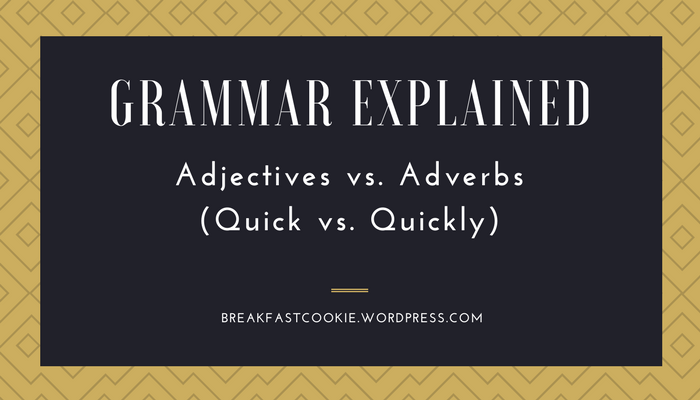Grammar: Adjectives vs. Adverbs

I often see people writing sentences like this:
“I was running very quick to the park.”
This is a common error that can bee avoided by explaining the difference between adjectives and adverbs, and when to use them.
Adjectives
These are words that describe nouns or things.
e.g. “He is a slow eater.” (I am describing HIM, the person is a noun.)
e.g. “His answers were true.”
e.g. “She wore an elegant red dress to dinner at the expensive restaurant.”
Adverbs
These words describe a verb or action, and they often look similar to adjectives. Luckily, you can identify most adverbs by their ending ‘-ly’, similarly to ‘-mente’ in Spanish.
e.g. “He eats slowly.” (I am describing how he EATS, the verb.)
e.g. “He answered truthfully.” (I am describing how he ANSWERED.)
e.g. “She walked elegantly into the room.”
There are, as always, a couple of exceptions:
Fast
The word ‘fast’ can be used as an adjective or an adverb.
- He went for a quick walk.
- He walks quickly.
- He went for a fast walk.
- He walks fast.
NOT: He walks fastly.
Good vs. Well
‘Good’ is an adjective and describes nouns:
“How was the interview?” “It was good.” (I am describing the noun, ‘interview’.
The word ‘well’ is the adverb equivalent ‘good’.
E.g. “How did the interview go?” “It went well.” (Here I am describing the verb ‘go/went’, not the noun ‘interview’ so I must use an adverb.
Note: ‘Well’ can also be used as an adjective to mean ‘healthy.’ or ‘fine’.
E.g. “How are you?” “I am fine, thanks.”
I hope this clears up any confusion!
The Cookie Chef.
